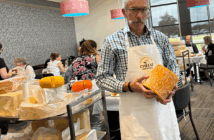
“We are pleased to have reached this milestone and to see the exciting capability we have in China now. This successful partnership paves the way for further trials and collaborations in the future. The results of the CLIMB study are also expected to create potential economic benefits for the New Zealand dairy sector,” says Auckland UniServices chief executive Dr Andy Shenk.
The CLIMB (Complex Lipids in Mothers and Babies – Comparison of Different Maternal Milk Preparations during Pregnancy) study, which was sponsored by Fonterra NZ and co-funded by the Primary Growth Partnership (PGP), was a first for CQMU and was the first trial delivered by UniServices in China.
The three-year trial recruited 1500 pregnant women and started in 2015. It followed the progress of infants for a year after birth. The trial explores the impact of mothers’ complex milk lipid intake on birth outcomes, infant brain development and general maternal health. The researchers are currently analysing the results of the CLIMB trial.
“The project not only reflects the efficient assistance and advanced level of the research teams of both parties, the Chongqing Medical University and the University of Auckland, but also reflects the strong leadership and sincerity of the management of the two parties,” says Professor Yang Zhu of the CQMU.
Chongqing is China’s most populous municipality (around 30 million) and its medical university was ranked ninth among all Chinese medical universities in 2019. The University of Auckland is New Zealand’s leading university.
Despite Chongqing being home to such a large population, there has been little applied nutrition biomedical research undertaken. The bio-banking facility and established patient database had to be introduced through the CLIMB study, and the hard work of the CQMU project team to establish a clinical nutrition trial unit and experienced research nurses, supported by UniServices’ project management expertise and Liggins Institute clinical trial expertise.
The resulting bio-bank and database now gives CQMU the chance to undertake hypothesis-generating research. It has serial biosamples and metadata throughout pregnancy, and some limited infant and paediatric data.
“This means that we can study a variety of socio-demographic, clinical, haematological and biochemical parameters from the perspective of pregnancy and infant outcomes. Bio-banks and metadata sets such as these can be “mined” for decades and support further research,” says Professor Philip Baker, the trial’s co-investigator along with Professor Hongbo Qi.




























































































